Comprehensive identification of lysine 2-hydroxyisobutyrylated proteins in Ustilaginoidea virens reveals the involvement of lysine 2-hydroxyisobutyrylation in fungal virulence
Comprehensive identification of lysine 2-hydroxyisobutyrylated proteins in Ustilaginoidea virens reveals the involvement of lysine 2-hydroxyisobutyrylation in fungal virulence作者机构:Hubei Key Laboratory of Plant PathologyHuazhong Agricultural UniversityWuhan 430070China School of Environmental SciencesUniversity of GuelphGuelphOntarioN1G 2W1Canada
出 版 物:《Journal of Integrative Plant Biology》 (植物学报(英文版))
年 卷 期:2021年第63卷第2期
页 面:409-425页
核心收录:
学科分类:09[农学] 0904[农学-植物保护] 090401[农学-植物病理学]
基 金:supported by the National Natural Science Foundation of China (32072371) the National Key Research and Development Program (2016YFD0300700, 2017YFD0301400) the Fundamental Research Funds for the Central Universities of China (2662018JC051)
主 题:Khib Ustilaginoidea virens virulence
摘 要:Lysine 2-hydroxyisobutyrylation(Khib) is a newly identified post-translational modification(PTM) that plays important roles in transcription and cell proliferation in eukaryotes. However, its function remains unknown in phytopathogenic fungi. Here,we performed a comprehensive assessment of Khibin the rice false smut fungus Ustilaginoidea virens, using Tandem Mass Tag(TMT)-based quantitative proteomics approach. A total of 3 426 Khibsites were identified in 977 proteins, sugg esting that Khibis a common and complex PTM in U. virens. Our data demonstrated that the2-hydroxyisobutyrylated proteins are involved in diverse biological processes. Network analysis of the modified proteins revealed a highly interconnected protein network that included many well-studied virulence factors. We confirmed that the Zn-binding reduced potassium dependency3-type histone deacetylase(UvRpd3) is a major enzyme that removes 2-hydroxyisobutyrylation and acetylation in U. virens. Notably, mutations of Khib sites in the mitogen-activated protein kinase(MAPK)UvSlt2 significantly reduced fungal virulence and decreased the enzymatic activity of UvSlt2. Molecular dynamics simulations demonstrated that 2-hydroxyisobutyrylation in UvSlt2 increased the hydrophobic solvent-accessible surface area and thereby affected binding between the UvSlt2 enzyme and its substrates. Our findings thus establish Khibas a major post-translational modification in U. virens and point to an important role for Khibin the virulence of this phytopathogenic fungus.



